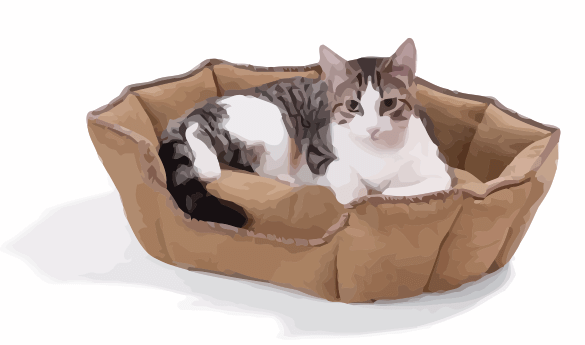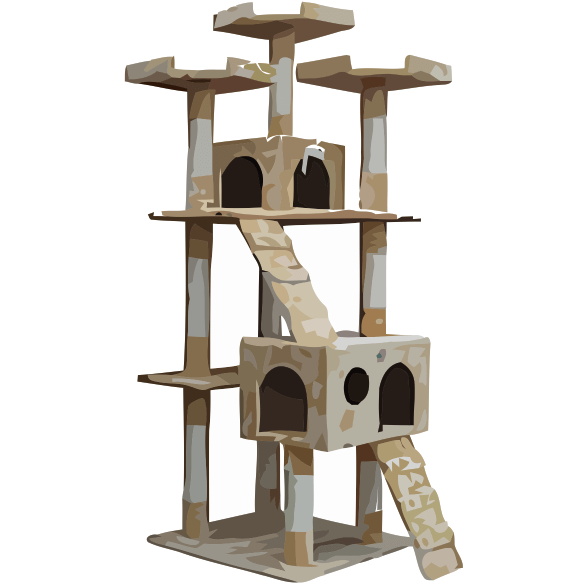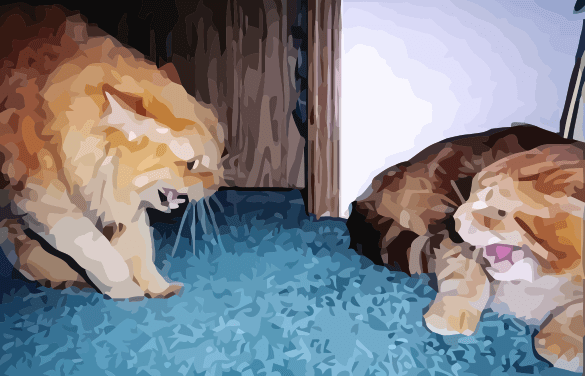Keeping Your Cat Happy
If you have a cat you undoubtedly know that, compared to other pets such as dogs, they are fairly easy to take care of. However, they are still living creatures that have some needs in order to live a healthy and happy life.
Safety: Keeping your cat safe is not always as easy as you might think. Cats are extremely curious, and therefore they often get themselves into tight situations. You'll need to check their living environment for obvious dangers such as unstable furniture and the potential for falling objects.
Health: Not much else matters if you're in bad health. It's the same for your cat. Make sure he gets the proper immunizations and regular vet care. If he doesn't feel well, because he is sick, he will not be very happy. Besides, a bit of preventive care can also save you money from having to deal with a more serious illness that progresses.
By knowing your cat's regular behaviors and doing a few simple checks regularly you can prevent health problems from become worse.

Socialization: Although cats can be left alone for many hours or even a few days, it doesn't mean they enjoy it. They need company too, especially from their owner whom they've become attached to. When you go on vacation try to find someone that can look after them and will give them a bit of attention, daily.

Play Time: Cats like to play. It is their instinct to chase things. Their eyes usually track things that move. In nature, this would be things like bugs, mice, birds, etc. So, wiggling a toy on a string in front of them will get their blood pumping. Variety is also important. Don't expect them to be interested in the exact same toys for hours.

If there are things to climb on cats will love it. They are made for climbing and for heights.
Be wary of laser toys. If the light flashes in their eyes it can cause permanent eye damage, even blindness.
Sleeping Area: While cats don't need an orthopedic mattress, they can really benefit from a good quality sleeping pillow, designed for cats. Because cats like to feel safe, these sleeping quarters usually have raised edges, and are best placed in the corner of the room. Remember to clean their beds regularly, but do not apply deodorants and perfumes.

Hiding Areas: Instinctively, cats like to hide, especially while they are resting. This is a protective mechanism. Tight spaces are heaven for cats. So, provide them with a few of these throughout the house. Even an old cardboard box will suffice or you can purchase commercially made hiding enclosures.
Scratching Posts: You should have at least one of these in your home. Cats need to scratch and if you don't have a scratching post they will use your furniture instead. They'll probably still use your furniture!
Treats: Hide small food treats throughout the house. Cats love to hunt and this will keep them busy for a while.
Litter: No one likes a dirty toilet and cats are no different. Clean and change their litter box regularly. This will reduce the chance of them not using it and it will also keep your living area cleaner and free of odors.
If you have more than one cat, each cat should have his own litter box. Keep about 4 inches (9 cm) of litter in the box at all times. Keep the litter box in a private space so the cat will not feel threatened while using it. Do not keep it in the kitchen since that would expose your food.
Don't use scented litter, as your cat may not like it. Remember, their smelling ability is much greater than ours.
Make sure the box is big enough for your cat to fit in it comfortably. If you use a covered box, make sure it is large enough on the top so your cat can maneuver easily.

Territory: There is no doubt that cats are territorial creatures. So allow them to have their own space. If you have more than one cat, you may find that they hardly approach each other. Give them their own food dish and, as mentioned above, their own litter box.
Do not keep too many cats in your house. Aside for hygienic reasons, cats will be very stressed if they are over crowded. They may get into fights or they may become ill.
Water: It's a good idea to have more than one bowl of fresh water throughout your home. Change it regularly to keep it fresh. Stale water can grow bacteria and it doesn't taste as good.
Food: Cats have specific diet requirements. They are not like humans where we can eat just about anything. Feeding them the wrong kinds of food can result in serious illness such as liver damage, kidney failure, blindness, and even death.
In general, they are protein oriented animals e.g. fish, chicken, beef, etc. Your best bet is to stick to high quality commercial cat food. Try a few different brands until you find one your cat prefers.
Avoid, at all costs, carbohydrates. Do not give them pasta, bread, cakes, etc. Luckily, cats are pretty good at avoiding things that are bad for them, but if they are hungry they may eat it.
Do not give them milk. Yes, you heard correctly. It's not that they won't drink it, especially if they're hungry. It's because milk has a carbohydrate, lactose to be exact, and carbohydrates are not digested easily by cats. Lactose-free milk is still not ideal so avoid it too.
Tuna is also something to be aware of. Cats love it, they will go crazy over it. Once in a while as a treat is fine, but it can become addictive. Giving your cat tuna too often can lead to mercury poisoning in their small bodies, plus a lack of nutrition from eating proper cat food.




I just bought my cat a pet bed and she really likes it. She's sleeping in it now and chooses it as a place to unwind.
Before, she would sleep in all kinds of strange places, somewhere new every day, and not always a safe place.
Thanks for the info - I was wondering if the 4-raised corners of her bed were beneficial to her, and apparently they are.